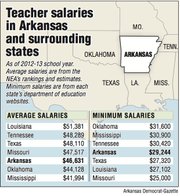Legislators on Tuesday asked for a cost analysis of increasing the required minimum starting annual salary for Arkansas teachers by about $1,750.
RELATED ARTICLES
http://www.arkansas…">State legislators pass budget billshttp://www.arkansas…">Counseling board executive director will resign earlierhttp://www.arkansas…">State-created weight-loss program in reviewhttp://www.arkansas…">Calendar
The House and Senate Education committees met jointly Tuesday morning to review several reports from the Arkansas Bureau of Legislative Research, including a study on how Arkansas’ teacher salaries rank compared with other states and what issues districts face in hiring and retaining qualified teachers.
Several legislators said it might be time to increase the state-mandated minimum salary requirements, which would also raise the average teacher salary in Arkansas - a figure that has lagged behind other Southern states over the past decade.
“In the [previous educational adequacy] study, we recommended 2 percent increases, but I’m struggling with how you would do that,” said Sen. Uvalde Lindsey, D-Fayetteville. “If you increase the base salaries in the salary matrix by 1 percent… that amounts to about $17 million to pay for that increase. The committee needs to look at what might happen in the salary matrix as a result of an increase. But it seems unconscionable that the minimum hasn’t been increased.”
Senate Education Committee Chairman Johnny Key, R-Mountain Home, said he had planned to ask the Bureau of Legislative Research to determine how much it would cost the state to increase the minimum teacher salary by 1 percent to 2 percent. Instead, committee members asked the bureau to calculate the cost of raising the minimum salary by about 6 percent, from $29,244 per year to $31,000 for a brand new teacher with a bachelor’s degree.
The last large increase in the state-mandated minimum pay was in 2004, when the Legislature increased it from $21,860 to $27,500. Over the past 10 years, that minimum salary has increased by only $1,744.
When the 2004 increase went into effect, Arkansas’ rank for minimum teacher pay among the states in the Southern Regional Education Board increased to seventh of 16, but dropped over the years until it hit 12th of 16 for 2012-13.
Bureau of Legislative Research staff members warned that the state-mandated minimum salary can be a misleading number when making comparisons between states or even between districts in Arkansas. Teachers unions often help negotiate pay raises and higher starting salaries for individual districts, and school boards also use starting pay as an incentive to attract new teachers.
In several states listed in the rankings, all of the school districts in those states paid a higher minimum salary than that mandated by their state Department of Education.
According to Arkansas Department of Education numbers from the 2012-13 school year, eight of Arkansas’ then 239 school districts used the state-required minimum salary for new teachers with no previous experience. Also according to those numbers, 30 districts used starting salaries less than $30,000, and 77 districts started teachers at a salary less than $31,000.
According to the Bureau of Legislative Research, the Springdale School District clocked in with the highest starting salary for 2012-13 at $44,570, followed closely by Bentonville, Rogers and Fayetteville, which all paid more than $41,000.
Bureau staff members said states’ average teacher salary was a better measure of what school districts are actually paying.
Arkansas’ average teacher salary for the 2012-13 school year was $46,631 - 12th out of the 16 Southern states. It was eighth the year after the 2004 minimum salary increase went into effect.
According to bureau research, the average teacher salary in Arkansas increased about 0.68 percent from the 2011-12 school year to the 2012-13 school year, while several surrounding states increased their average salaries by as much as 2.5 percent.
“Unless we can be comfortable with the unconscionable differences, is there a way to buffer those salaries where they are so low in those districts that are a high priority or might have problems retaining teachers?” asked Sen. Joyce Elliott, D-Little Rock. “The whole point of this study of looking at these things is determining if adequacy is being achieved. Whether a district can recruit and retain highly qualified teachers… if they are unable to do that, you run up against not fulfilling that adequacy mandate.”
Many of the school districts in Arkansas that use the state mandated minimum are very small and are located in rural areas that have struggled for years to attract teachers.
Arkansas, Pages 9 on 03/12/2014

